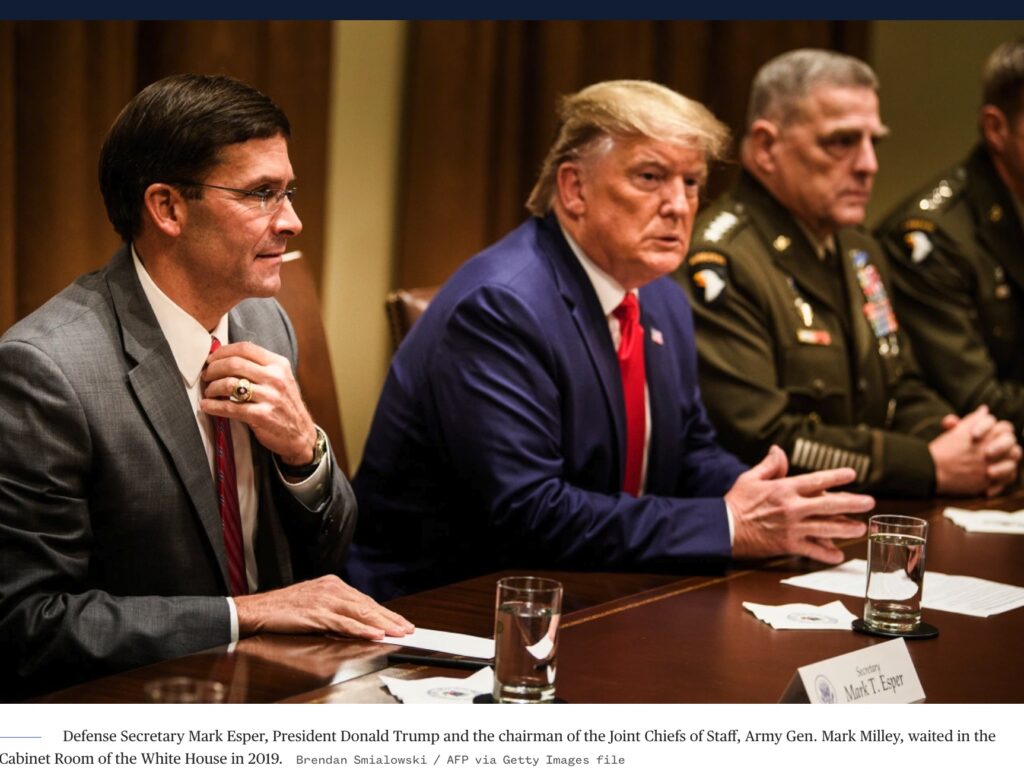
NBC, Fears grow that Trump will use the military in ‘dictatorial ways’ if he returns to the White House
By , , and
[Editor’s note: How opponents of democracy plan to sabotage democracy in the name of “democracy”.]
WASHINGTON — Donald Trump is sparking fears among those who understand the inner workings of the Pentagon that he would convert the nonpartisan U.S. military into the muscular arm of his political agenda as he makes comments about dictatorship and devalues the checks and balances that underpin the nation’s two-century-old democracy.
A circle of appointees independent of Trump’s political operation steered him away from ideas that would have pushed the limits of presidential power in his last term, according to books they’ve written and testimony given to Congress. Most were gone by the end. In a new term, many former officials worry that Trump would instead surround himself with loyalists unwilling to say no.
Trump has raised fresh questions about his intentions if he regains power by putting forward a legal theory that a president would be free to do nearly anything with impunity — including assassinate political rivals — so long as Congress can’t muster the votes to impeach him and throw him out of office.
Now, bracing for Trump’s potential return, a loose-knit network of public interest groups and lawmakers is quietly devising plans to try to foil any efforts to expand presidential power, which could include pressuring the military to cater to his political needs.
Those taking part in the effort told NBC News they are studying Trump’s past actions and 2024 policy positions so that they will be ready if he wins in November. That involves preparing to take legal action and send letters to Trump appointees spelling out consequences they’d face if they undermine constitutional norms.
“We’re already starting to put together a team to think through the most damaging types of things that he [Trump] might do so that we’re ready to bring lawsuits if we have to,” said Mary McCord, executive director of the Institution for Constitutional Advocacy and Protection at Georgetown Law.
Part of the aim is to identify like-minded organizations and create a coalition to challenge Trump from day one, those taking part in the discussions said. Some participants are combing through policy papers being crafted for a future conservative administration. They’re also watching the interviews that Trump allies are giving to the press for clues to how a Trump sequel would look.
Other participants include Democracy Forward, an organization that took the Trump administration to court more than 100 times during his administration, and Protect Democracy, an anti-authoritarian group.
“We are preparing for litigation and preparing to use every tool in the toolbox that our democracy provides to provide the American people an ability to fight back,” said Skye Perryman, president of Democracy Forward. “We believe this is an existential moment for American democracy and it’s incumbent on everybody to do their part.”
America’s commander-in-chief has vast powers at his disposal — some well-known, others not so much. Some lawmakers and pro-democracy advocates worry there may be nothing stopping a president from mobilizing the military to intervene in elections, police American streets or quash domestic protests.
GOP candidates targeting Trump as Iowa caucuses near
Wary of Trump’s staying power — he is running about even with President Joe Biden in the polls — Democratic lawmakers already known to be adversarial to Trump are working on a parallel track.
Among the least-understood tools available to a president is the Insurrection Act. Vaguely worded, it gives a president considerable discretion in deciding what constitutes an uprising and when it is OK to deploy active-duty military in response, experts say.
Some lawmakers on Capitol Hill worry that Trump might invoke the act to involve the armed forces in the face of domestic protests or if the midterm elections don’t go his way.
Sen. Richard Blumenthal, D-Conn., is crafting a bill that would clarify the act and give Congress and the courts some say in its use. Its chances of passage are slim given that Republicans control the House and are largely loyal to Trump.
“There are an array of horrors that could result from Donald Trump’s unrestricted use of the Insurrection Act,” Blumenthal said in an interview. “A malignantly motivated president could use it in a vast variety of dictatorial ways unless at some point the military itself resisted what they deemed to be an unlawful order. But that places a very heavy burden on the military.”
Trump’s vow to seek “retribution” on behalf of those he says have been “wronged” and “betrayed” has sparked fears that he would use presidential powers more broadly as a cudgel against political foes. Compounding the anxiety, he remarked at a Fox News town hall last month that he would be a “dictator” — though only on his first day in office for the purposes of closing the border and drilling for oil. He later posted on his social media site that he had made that remark “in a joking manner.” More recently, Trump told a Fox News town hall in Iowa that “I’m not going to have time for retribution.”
Detractors aren’t buying it.
“He’s a clear and present danger to our democracy,” said William Cohen, a former Republican senator from Maine and defense secretary in the Clinton administration who is not involved in the loose-knit network. “His support is solid. And I don’t think people understand what living in a dictatorship would mean.”
Sent a list of questions about the fears recounted in this article, Trump’s campaign did not respond.
‘The same lessons Lincoln learned’
Trump’s legal troubles offer new insights into his vision of a presidency that has shed restraints. Not even bribery or murder could land a president in jail so long as Congress didn’t first impeach and convict him, under a legal theory his lawyers advanced in a federal appeals court hearing Tuesday.
Trump is facing charges for attempting to overturn the 2020 election results. In his defense, his legal team contends that in trying to reverse Biden’s victory, Trump fell within the “outer perimeter” of his official duties and is thus shielded from prosecution.
Where does such reasoning lead? In the hearing, which Trump attended, one judge sketched ominous scenarios about what a president might do under that notion of broad presidential immunity.
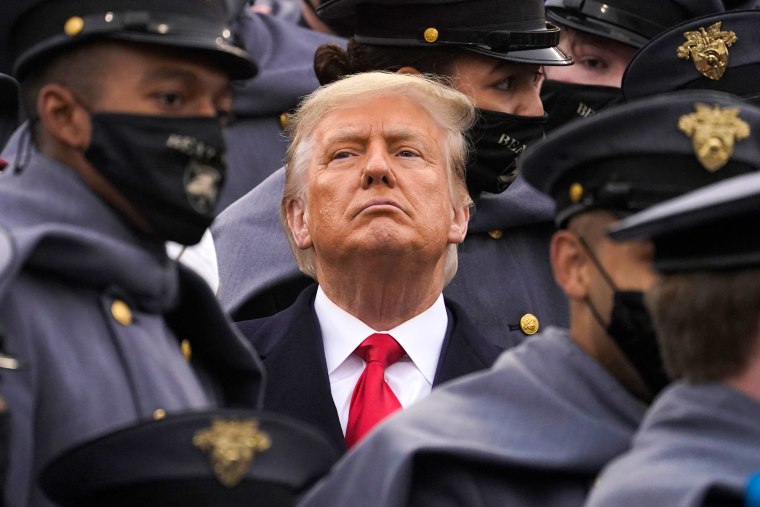
Judge Florence Pan asked one of Trump’s lawyers whether a president could, for example, sell military secrets or order the elite SEAL Team 6 to assassinate a political rival with impunity under the legal argument.
“He would have to be impeached and convicted first,” replied Trump’s lawyer, Dean John Sauer.
In an interview, Rep. Adam Smith, the top Democrat on the House Armed Services Committee, said of Trump: “He’s going to be one creative motherf—– when it comes to trying to figure out how to abuse it [power]. Whatever your guess is, open up your imagination a little more.”
In the last term, Trump’s generals and civilian advisers proved to be a restraining influence: They’d tell him when he had a bad idea. And for a while, Trump seemed to take seriously the advice coming from aides with a military pedigree. “My generals,” he called them. Relations soured as time passed. One by one, most quit or were fired. A new team may not be so quick to cross him.
“The same lesson Lincoln learned in his first two or three years are the lessons that President Trump learned: Just because a guy has a title and uniform doesn’t mean anything,” Steve Bannon, a Trump ally and former senior White House official, said in an interview.
Soon after the 2020 election, as Trump was refusing to concede defeat, he upended the Pentagon leadership, firing Defense Secretary Mark Esper even though at that point he was a lame duck with just over two months left in the term.
The upheaval was jarring, recalled Mark Milley, then-chairman of the Joint Chiefs of Staff, in an interview with the House committee investigating the Jan. 6, 2021, attack on the U.S. Capitol.
In its final written report, the committee wrote that “some at the [Defense] Department had genuine concerns, counseling caution, that President Trump might give an illegal order to use the military in support of his efforts to overturn the election.”
‘A new sheriff in town’
Plenty of rank-and-file members of the armed forces appear sympathetic to Trump’s cause. George Washington University’s program on extremism found that more than 150 of the nearly 1,200 people who were charged with crimes for the Jan. 6 attack on the Capitol came from a military background.
“The military is hundreds of thousands of people strong, and ultimately Trump will find people to follow his legal orders no matter what,” said a former senior official who served in the Trump administration, speaking on condition of anonymity to talk freely.
“The Insurrection Act is a legal order, and if he orders it there will be military officers, especially younger men and women, who will follow that legal order,” the former official added.
In policy videos posted to his website, Trump said he would provide “record funding for our military.” He faulted Biden for enacting “woke policies” that are hampering military recruitment and said he would flush out what he called “Marxism,” “communism” and “fascists.”
Trump’s allies say there is little doubt that he would make the military a particular focus.
“The Pentagon is going to be a super high priority, and they have to understand there will be a new sheriff in town,” Bannon said. “You’re going to see a massive housecleaning at the Pentagon. President Trump wants to put in a philosophy of how to win wars.”
‘Like any good dictator’
As president, Trump was both fascinated by the military’s capabilities and frustrated by advisers who tried to dissuade him from carrying out plans they deemed ill-advised. Esper wrote in his memoir, “A Sacred Oath,” that in an Oval Office meeting, Trump inquired about having U.S. soldiers shoot domestic protesters in the legs. Esper wrote that his reaction to Trump’s suggestion was one of “utter disgust.”
A couple of times in 2020, Esper wrote, Trump broached the idea of firing missiles into Mexico to destroy illegal drug labs. Esper told Trump that would be an act of war; Trump replied that the U.S. would deny involvement, Esper wrote.
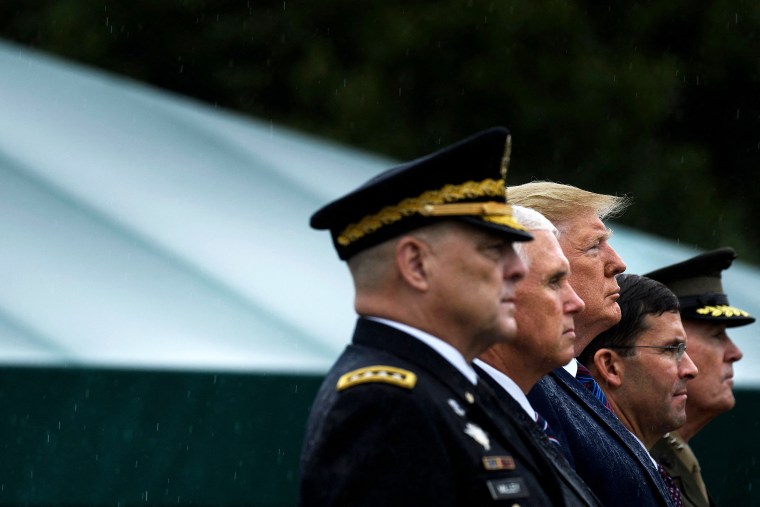
“My sense was that Trump always came to the Defense Department to solve his toughest problems, such as building a wall on the border, handling protesters in America’s streets, and dealing with Covid,” Esper said in an interview. “He kept coming back to DOD because it is seen as an institution that gets things done. But in some situations, this can end up politicizing DOD if the military is asked to do things it shouldn’t be doing.”
Lawmakers like Blumenthal are taking steps akin to placing sandbags around a building before a hurricane hits. They’ve made it tougher for a president to pull out of the NATO military alliance, for example. Unhappy that many NATO countries weren’t ponying up enough for defense, Trump had considered dropping out of the post-World War II alliance, his former national security adviser John Bolton wrote in his book, “The Room Where It Happened.”
Trying to pull out of NATO won’t be so easy next time around. Last month, Biden signed a $886 billion defense bill that bars a president from unilaterally withdrawing from NATO, a move that could stymie Trump’s 2024 campaign pledge to “fundamentally” reevaluate “NATO’s purpose and NATO’s mission.”
“A second Trump term would be day after day of constitutional crisis — the Justice Department one day, the Pentagon the next and Homeland Security the next,” Bolton said in an interview. “It would be unremitting.”
The military’s role is unique in that soldiers and sailors are trained to obey the commander-in-chief but are told not to follow illegal orders.
Things get murky when an order comes down in the category of “lawful but awful,” as some military experts describe it. There were a few of those in the last term, former Trump appointees say, that they managed to beat back.
While Trump never invoked the Insurrection Act, he believed the protests in the summer of 2020 surrounding the George Floyd killing made the U.S. look “weak” and wanted the military to quash the demonstrations, former appointees said.
Sending troops into American streets is often a bad idea, military experts say, pointing to the sort of tragedy that unfolded at Kent State University in 1970 when National Guardsmen shot and killed four students protesting the Vietnam War.
In his appearance before the congressional Jan. 6 committee, Milley said that there was “significant pressure on Secretary Esper to deploy forces” to deal with the 2020 racial justice protests.
Trump’s subordinates deflected such demands from the president. But in a new term, critics expect he’ll surround himself with loyalists determined to carry out his commands, whatever their merit.
“Like any good dictator, he’s going to try to use the military to basically perform his will,” said Leon Panetta, former defense secretary and CIA director in the Obama administration.
‘Political performance theater’
Defense secretaries under Trump didn’t enjoy much job security. Five came and went over the four years. But there is likely to be no shortage of candidates should Trump return to office.
One possible nominee is Keith Kellogg, a former senior national security official. Trump recently praised Kellogg’s television appearances on Fox News and continues to value his advice, according to a person with direct knowledge about the matter.
Retired Gen. Michael Flynn, who served briefly as Trump’s national security adviser, would be “at the top of the list to be taken care of,” said another person familiar with Trump’s thinking. Flynn’s role in a second Trump administration could be “whatever he wants,” this person said.
A barrier for Flynn might be Senate confirmation. Flynn pleaded guilty to lying to the FBI. Trump later pardoned him.
“I definitely think that Gen. Flynn would be interested in helping his friend Donald Trump in his next administration,” Flynn’s brother Joseph Flynn said in an interview. He added, though, that “DOD secretary is a role that requires congressional approval. That’s a lot more challenging for someone as much of a lightning rod as Gen. Flynn.”
Nominating Flynn might also draw renewed attention to his appearance on the conservative network Newsmax in December 2020, when he said that Trump could use “military capabilities” to rerun the election in swing states if he chose.
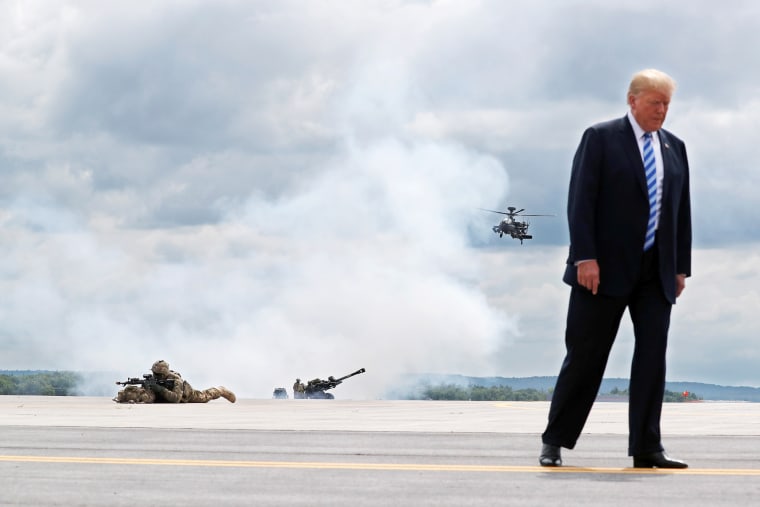
Other potential nominees include Mike Pompeo, who served as both secretary of state and CIA chief during Trump’s administration. He has told people that if there is a job for him in a future Trump administration, defense secretary would most interest him, a person familiar with the matter said.
Pompeo gets credit for not challenging Trump for the 2024 Republican nomination, said Peter Navarro, a former senior White House adviser who has been involved with efforts to help plan for a future conservative administration.
“One of the things that did not go unnoticed in Trumpland was Mike not getting into the presidential primary,” Navarro said in an interview.
Another candidate would be Christopher Miller, whom Trump made acting secretary after ousting Esper. “We had Miller at the end who did a very good job,” Trump said in an interview last month with conservative talk radio host Hugh Hewitt.
“The starting point for a second Trump term will be the last year of his first term,” Esper said. “The caliber of civilian leaders you would want to see in the Defense Department and elsewhere won’t be there. Loyalty will be the attribute Trump will be seeking above all else. He won’t pick people like [former Defense Secretary] Jim Mattis or me who will push back on him. So, the question becomes, what harm might occur over four years?”
That depends on who you ask. America’s democracy has proved remarkably resilient. It has endured a civil war and economic depression, political scandals and domestic protests. In Trump, though, some former officials see a man backed by a fervent movement that could shatter the American experiment.
“We’re about 30 seconds away from the Armageddon clock when it comes to democracy,” said Cohen, the former Republican senator and defense secretary. “I think that’s how close we’re coming to it when you have a presidential candidate who can be indicted on 91 counts, who can be [found liable for] sexual aggression, who we have seen lies pathologically, who has flouted every rule in the book.”
Others who’ve seen Trump up close aren’t convinced. Plenty of obstacles would confront an administration that tries to steer the nation in an authoritarian direction, including the courts, Congress and the determined opposition of pro-democracy activists.
“The republic has been around for over 240 years now,” Bolton said. “We’ve had our share of bad people in this country, and the republic is still here. I don’t think one man, however influential, is going to bring it down. You need to mobilize people for the fight ahead and not say it’s over.”
Ken Cuccinelli was a senior Homeland Security official working under Trump. He was at the center of an issue that animated the Trump White House and remains a fixation of the Trump campaign: immigration. In private conversations with Trump over securing the border, Cuccinelli said he came away convinced that the former president was mostly bluster.
Before the 2018 midterm elections, Trump sent thousands of U.S. troops to the southern border to confront a caravan of Central American migrants making their way to the U.S.
“It was total political performance theater,” said Cuccinelli, a founder of a super PAC backing Trump GOP primary rival Ron DeSantis. “They were heavily armed with paper clips and laptops.”
“The guy isn’t running on anything particularly consistent,” he added. “It’s just all about him.”
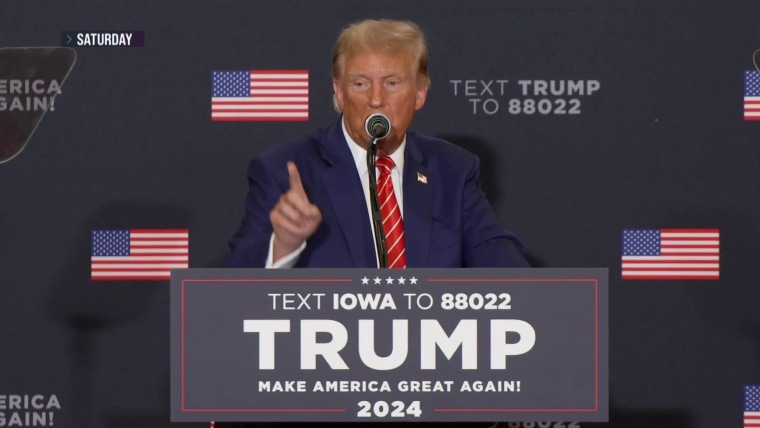



No comments:
Post a Comment